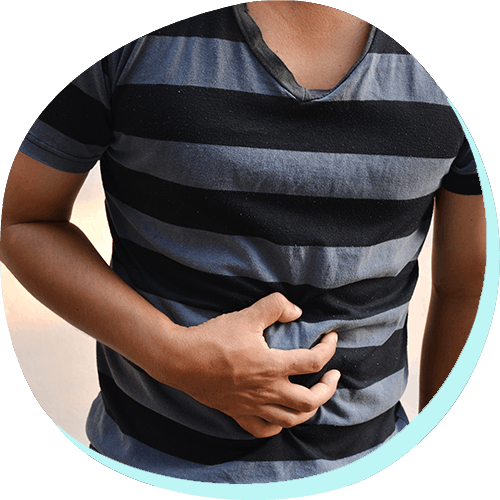If you’re feeling uncomfortably full, you might be experiencing bloating as a result of gas buildup in your abdomen. There are several remedies to this painful problem, ranging from dietary changes to exercise.
Recently, taking probiotics has emerged as a potential solution to digestive issues, but do probiotics help with bloating? To truly treat gas and painful belly bloat, it’s important to understand its causes and why it happens. Read on to learn what it is, why it happens, and whether to take probiotics for gas and bloating.
What are Gas and Bloating, and What Causes Them?
Gas is a normal part of the digestive process. Humans normally rid themselves of excess gas either by burping or passing gas. Gas pain may occur if gas is unable to move through your digestive system and becomes trapped in one place.1
Bloating refers to an uncomfortable sense of fullness in the upper abdomen that can be influenced by gas and may be accompanied by a visible increase in the size if your abdomen, which is known as distention.1,2
Gas buildup that leads to pain and bloating can be attributed to a few factors. Stomach gas is caused by swallowing air while eating or drinking. However, gas can also form in your large intestine when certain carbohydrates—fiber and certain starches and sugars—are fermented by bacteria after they aren’t fully digested in your small intestine.1
Many people may experience abdominal cramps, bloating, and flatulence when they eat milk, certain cheeses or ice cream because they lack the enzyme that is necessary for the proper digestion of milk sugars found in dairy products.2
Belly bloat and distention may also be attributed to bacterial overgrowth, which occurs when there is an excess amount of normal bacteria in the small intestine. This may result in an overproduction of intestinal gas, which may lead to uncomfortable bloating and abdominal distention.2
Treating Gas and Bloating
Belly bloat and gas pains are most often treated with dietary changes and lifestyle modifications. Changing what you eat may help reduce the amount of gas that you produce or help gas move through your system more quickly. Some find that keeping a journal of what they eat may help to pinpoint problem food items, while others find that smaller portions and making a point to thoroughly chew food is more effective.3
If you’re a smoker, you might be swallowing excess air with every cigarette. Quitting can drastically affect your overall health, as well as reduce the potential for gas pains. Regular exercise has been found to be beneficial to your digestive system. It reduces the risk of constipation, which can cause a buildup of gas in your colon, leading to uncomfortable bloating.3
What Do Probiotics Do?
Another treatment option for gas and bloating is taking probiotics, which are a combination of live beneficial bacteria and yeasts that naturally live in your body and help make up your microbiome.5 This is a diverse group of organisms called microbes that work to keep your body healthy. Microbes are a combination of bacteria, fungi, viruses and protozoa.5 The primary job of probiotics within your body is to maintain a healthy balance and keep bad bacteria—the kind that can make you sick—in check.
Should I Take Probiotics for Gas and Bloating?
Probiotics are generally considered safe, and many health providers will suggest giving them a try to see if they improve your overall health.5 An easy way to do this is to add more yogurt to your diet, especially if dairy is not responsible for your gas pains.
Purchasing probiotic supplements, however, can be tricky. It’s important to remember that there are many different kinds, and that they might all cause your body to react differently. For instance, lactobacillus is a type of bacteria that is commonly used as a probiotic. It has more than 120 species and over a dozen of them are used in different probiotics.4
Other types of “good” bacteria are the same way—there are lots of different species of the same basic type of bacteria, and it can be difficult to find the one, or amount that works best for you without wreaking havoc on your digestive tract.
Some people who take probiotics may suffer from an upset stomach, diarrhea, gas and bloating after starting to take them.5 Additionally, people who have recently had surgery or have a compromised immune system should avoid taking probiotics, as there is a risk of infection.5
The research on probiotics is still in its early stages. If you’ve considered taking probiotics for gas and bloating, talk to your doctor first.
Gas and bloating affect many people, and while there is no solution that works perfectly for everyone, there are some solutions and changes you can make to your diet and lifestyle that may help to make you feel more comfortable over time.
If you’re experiencing discomfort and bloating due to gas, Gas-X Extra Strength Chewables may help. These tablets come in two great flavors, and contain simethicone that can help alleviate uncomfortable gas and bloating.
- Gas and gas pains. The Mayo Clinic. https://www.mayoclinic.org/diseases-conditions/gas-and-gas-pains/symptoms-causes/syc-20372709. Accessed 3/31/2021. Referenced text is highlighted in the source material.
- Belching, Bloating, and Flatulence. American College of Gastroenterology. https://gi.org/topics/belching-bloating-and-flatulence/. Accessed on 3/31/2021. Referenced text is highlighted in the source material.
- Gas and gas pains – diagnosis and treatment. The Mayo Clinic. https://www.mayoclinic.org/diseases-conditions/gas-and-gas-pains/diagnosis-treatment/drc-20372714. Accessed on 3/31/2021. Referenced text is highlighted in the source material.
- Prebiotics, probiotics, and your health. Mayo Clinic. https://www.mayoclinic.org/prebiotics-probiotics-and-your-health/art-20390058. Accessed on 3/31/2021. Referenced text is highlighted in the source material.
- Probiotics. Cleveland Clinic. https://my.clevelandclinic.org/health/articles/14598-probiotics#. Accessed on 3/31/2021. Referenced text is highlighted in the source material.






